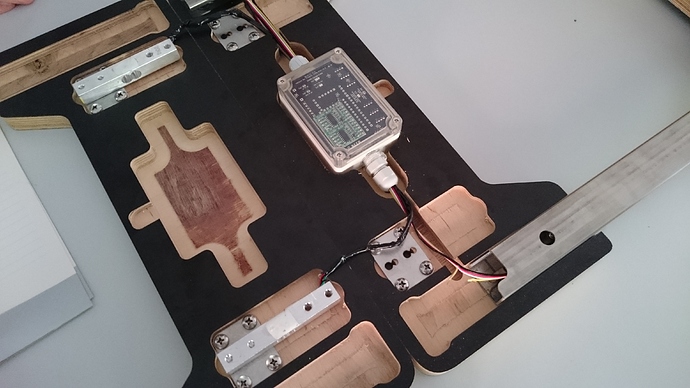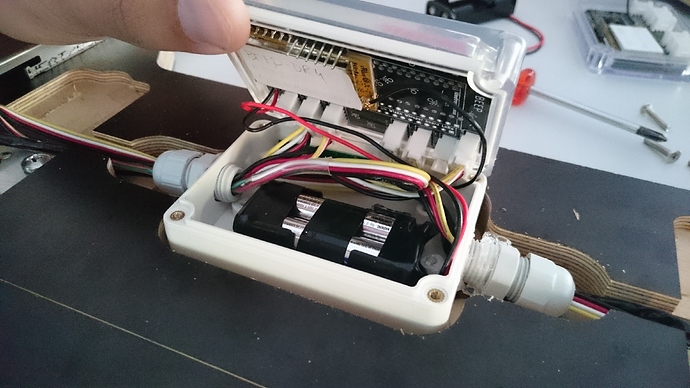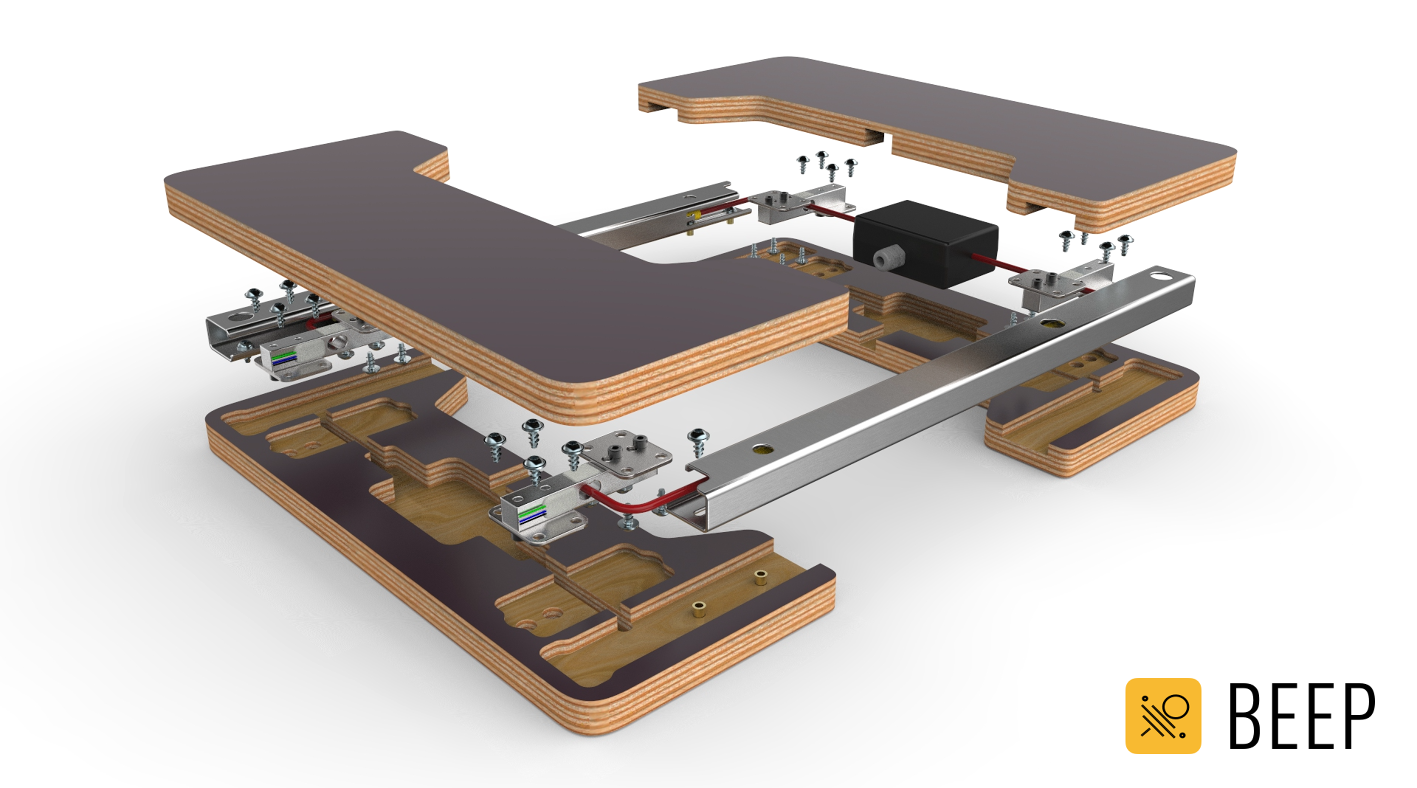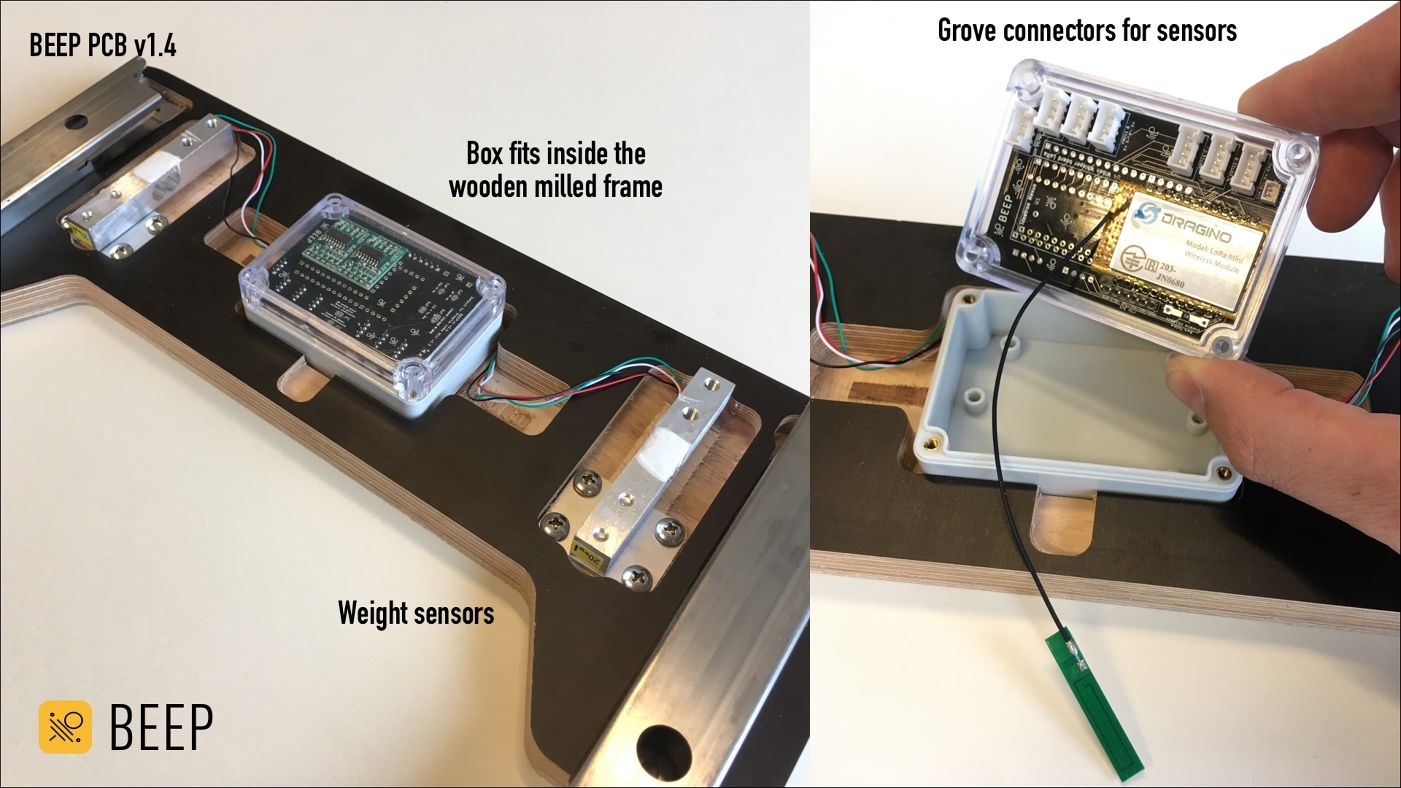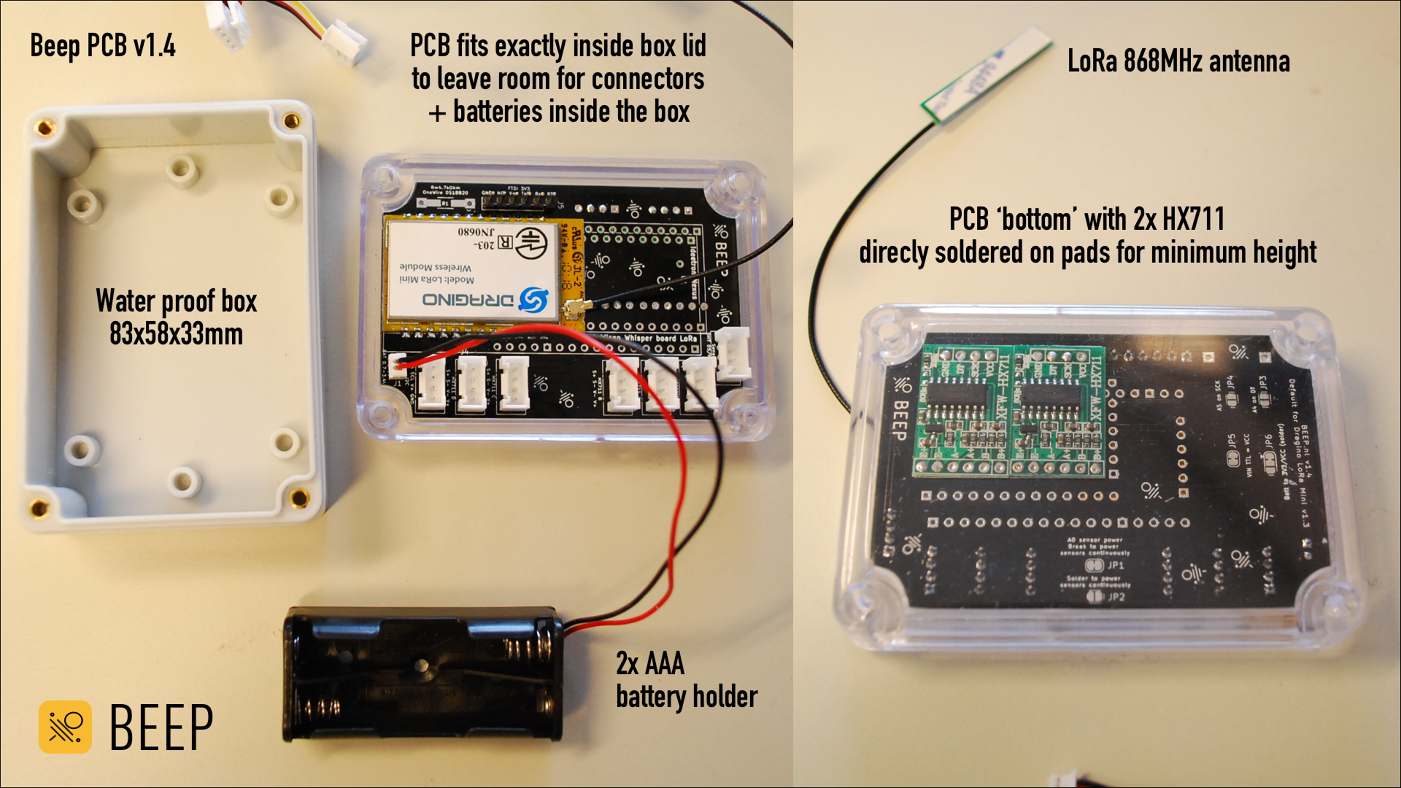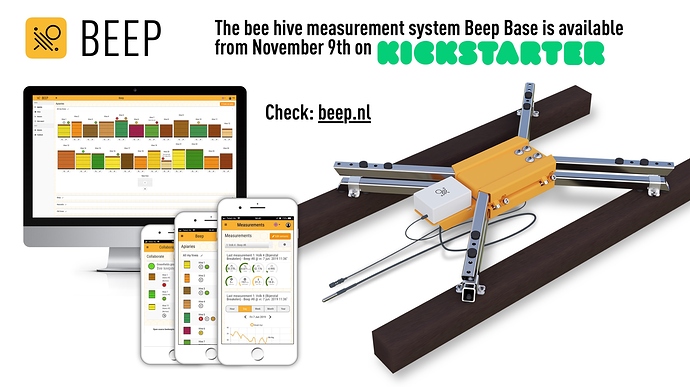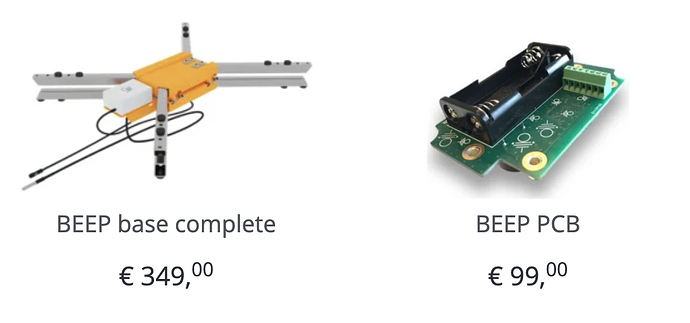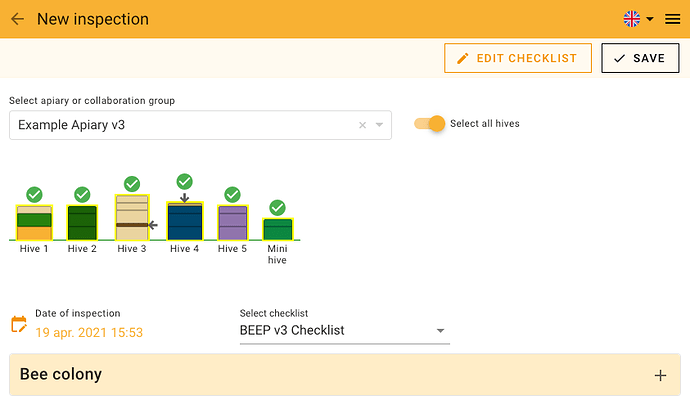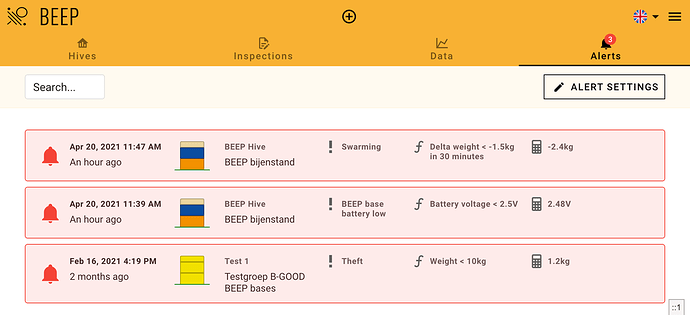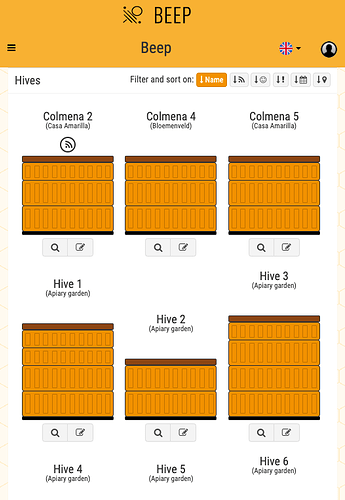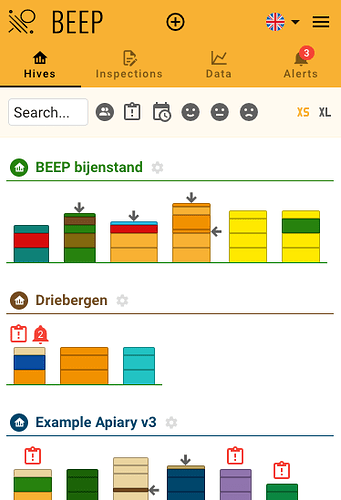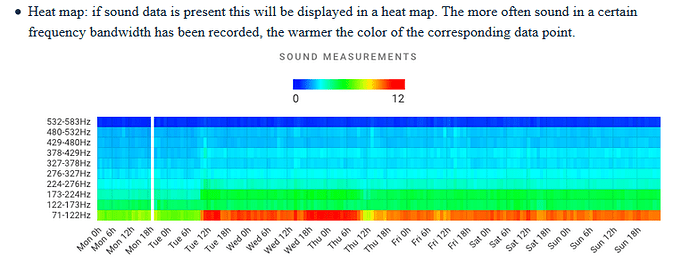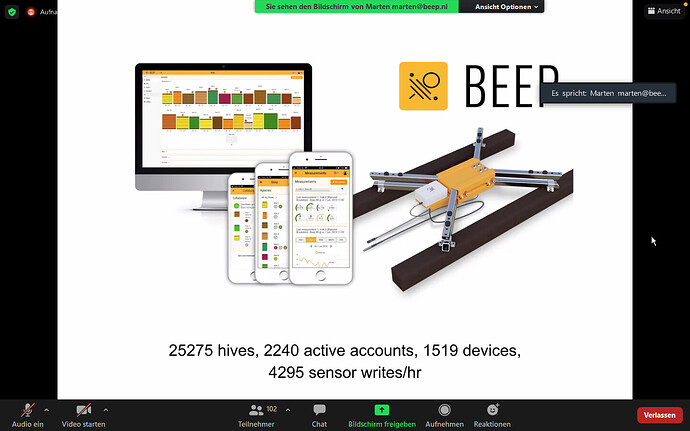What is the status of the LoRa coverage in Germany?
@marten.schoonman what do refer to with “LoRa coverage”? Do you actually mean “The Things Network”, which is building a distributed LoRaWAN network?
I really like TTN. The reason is: You can use existing TTN gateways and in case you have no gateway nearby you can add your own to the network.
Yes indeed. TTN is the crowd-sourced network. See map at The Things Network - this partly answers my question ;-) Mobile phone providers are also starting to roll it out at a fee.
Beep is not the App only but also a hardware scale! On the Workshop in Bremen we had the chance to see the Beep hardware in real:
Beep uses two normal HX711 board but solder them without pin headers to the main PCB directly. I thought this is only possible with castellated hole (“half hole”) but pim toled me that it fits also tight with nomal holes on the main PCB and the HX711 PCB.
The used load cells are 20 kg rated only. So I think this is really a weak point of the current design. Also the temperatur dependency of the load cells have to be tested.
Beep uses an interesting MCU-LoRa-Module combination, the Dragino LoRa Mini. I had this not on my plate but it seems an interesting low power alternative to a Pro Mini + RFM95. It uses the ATMega328P like the Arduino Uno, so it has also the same memory limitations. @iconize we talked about a lager memory than the Uno, but I could only find the same as the Uno in the spec.
But you have not to use the Dragino board, the Beep PCB is prepared to work with the Whisper Node LoRa from Wisen or the Ideetron Nexus.
@clemens, we talked about the Arduino mini (which has a bit less memory than the Arduino Uno). The Dragino LoRa Mini indeed has the same memory as Arduino Uno.
Great to hear that Beep is part of a EU Horizon 2020 funding with 8 million in total! Congratulation to @marten.schoonman and @iconize!
Topic Description
Specific Challenge:
The outputs of beekeeping can be private goods (e.g. honey production), public goods and services (e.g. pollination of wild flowers) or in-between (e.g. non-contracted pollination of crops). Many initiatives aim to expand knowledge on honeybee colonies and their environment. However, the lack of a holistic approach makes it difficult to use this knowledge to best effect. Key factors for healthy and sustainable European beekeeping are determined by what happens in or around hives but also by wider socioeconomic and ecological conditions. However, much still needs to be learnt about the interactions of stressors affecting honeybees and their relative contribution to colony losses. The EFSA is developing an integrated risk assessment through the Multiple Stressors in Bees (MUST-B) project. As part of the project, the HEALTHY-B initiative provides a toolbox to assess honey bee colony health in a holistic way. This conceptual framework, the Health Status Index, needs further work to become operational. Little is known about how beekeepers assess and overcome the complexity of their business environment and what and how it influences their health management decisions (e.g. to treat against pathogens or not, to continue keeping bees or to quit, to replace lost colonies or not, to use local or introduced subspecies) and what makes them successful, including whether and how healthy colonies result in sustainable beekeeping and pollination. More information is needed on the role of actors other than beekeepers.
Scope:
Proposals will develop ready-to-use tools for operationalising the ‘Health Status Index’ developed by EFSA[1] to enable data collection and return to beekeepers, while exploring the various socio-economic and ecological factors beyond bee health to provide comprehensive blueprints of successful business model(s) of European beekeeping. Proposals should also consider issues related to emerging risks or pathogens (e.g. the small hive beetle and the Asian hornet Vespa velutina ). Proposals should aim to create an EU platform to collect and share knowledge of science and practice related to honeybees, their environment and agricultural and beekeeping practices, in order to develop and implement an action plan for a coordinated and harmonised approach to the collection of related data and information and to minimise the impact of biotic and abiotic stressors. The proposals should build on past or ongoing EU-funded research (e.g. Bee Health Workbench[2]), and take into account other relevant EU initiatives (e.g. evaluation of the EU’s apiculture measures[3], Member State bee monitoring projects), and entities (EFSA, EURL, JRC), as appropriate. Funded activities will include organising and coordinating data sets and standards relating to the environment and agricultural and beekeeping practices relevant to the monitoring of honeybee health and giving all relevant stakeholders access to such information. Work will serve to select the most promising and relevant indicators for bee health that could be developed and/or tested, and validate technologies for monitoring colonies and indicators in an automated or semi-automated way to facilitate standardised and accurate data collection and transfer. The selected project should carry out a pilot study in different representative European countries to test, standardise and validate methods for measuring and reporting selected indicators and factors affecting bee health, making it possible to give appropriate feedback to beekeepers both through dissemination and training and perform statistical analyses of the relative importance of relevant biological, chemical and environmental stressors affecting bee health and their pollination services. A multi-actor approach bringing together beekeepers, bee inspectors, other stakeholders (e.g. plant growers) and scientists (including social scientists) is required[4].
The Commission considers that proposals requesting a contribution from the EU of up to EUR 8 million would allow this specific challenge to be addressed appropriately. Nonetheless, this does not preclude submission and selection of proposals requesting other amounts.
Expected Impact:
Funded activities will provide the critical knowledge necessary to understand bee colony health and identify important socio-economic components of sustainable beekeeping. The outputs of the project must contribute to:
- an EU platform on science and practice in relation to honeybees, their environment and agricultural and beekeeping practices;
- a pilot toolbox to improve monitoring of honeybee colonies and assessment of the multiple stressors that affect colony health;
- a better understanding of the management decisions made by beekeepers;
- potential and viable business models for EU beekeeping, with and without public interventions;
- support to scientists, risk assessors and policy makers in assessing and managing multiple stressors that affect the sustainability of the EU’s apiculture.
More generally, the funded activities will help beekeepers better manage honeybees and contribute to the sustainability of EU beekeeping and related pollination services.
Cross-cutting Priorities:
Socio-economic science and humanities
RRI[1]see related scientific opinion (EFSA, 2016)
[2]http://bees-dashboard.azurewebsites.net/BeesHome.html
[3]http://ec.europa.eu/agriculture/evaluation/market-and-income-reports/apiculture-2013_en
[4]See definition of the ‘multi-actor approach’ in the introduction of this Work Programme part.
The BOB project has financed a new sharing / collaboration feature in Beep. Now it is implemented in the new public release also! Great and nice to use open source software!
Getting ready for the crowdfunding campaign for the BEEP base! More information @ BEEP base | BEEP - Bijenmonitoring
The Kickstarter campaign is on-line!
Already made it to the U.S.:
Nice to hear that Beep is growing! From the 2020-04-09 newsletter:
This week, we have updated our services to a new, bigger server. Since the user base of the BEEP app has almost reached 3000 beekeepers, the old server needed to be upgraded. When we changed servers, the inspection and sensor data of Saturday the 4th of April were not transferred. So, if you entered data on that day, you will not yet see it in the BEEP app.
However, the data is not lost but still available in the old server. We will transfer that data to the new server as soon as possible. So, you do not have to do so yourself. If you already re-entered your data, you can just delete the doubles in case there are any.
From the conference about sound analysis:
Default is 10 bins between 71 and 583Hz. Number of bins and start and end frequency can be changed with the native app. The Fourier transformation is done on the PCB (edge processing).
You can now order the BEEP base or just the LoRa ultra low power PCB via https://www.beep-shop.nl/en_GB/ !
A new version (v3) of the beep app is on the way! With new features: among others: bulk inspections and alerts!
From the beep newslette (2021-06-15)
Bulk inspections
Inspect multiple hives per apiary / group at once by selecting the hives you want to include. The inspection will be saved for each hive individually, such that it can later be retrieved (and edited / deleted) per hive.
Alerts
If you own a BEEP base you can set alerts, such that you will receive an alert when the measurement data meets certain requirements. For example, a sudden drop in weight because of swarming. Alerts will be shown here and in the Hives overview, you can choose to receive them via email as well.
… and a before – after view what was done for beautification:
BEEP app v2
BEEP app v3
From the beep newsletter (2021-09-22)
I think the update announced in the summer was not shipped till now but is planned for this October as you can reed in the newsletter. You can find an overview about the v3 features at
Sound data will be visualized as carpet-plot like known in many FFT and sound visualization software:
Beep’s hardware got a lift up
Recordings from the BEEP event.
